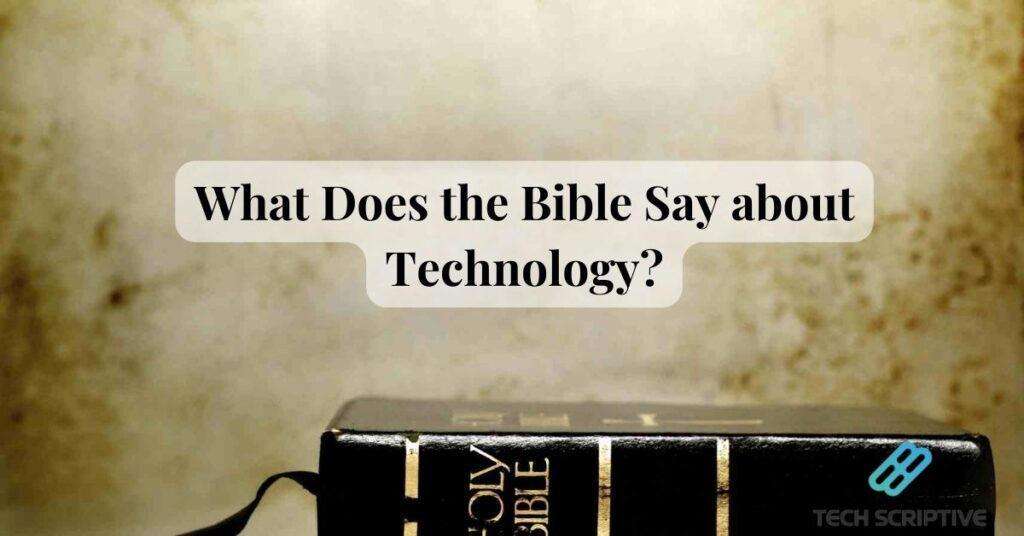Technology, as a tool, extends our abilities and responsibilities, reflecting our God-given creativity and dominion over creation. Its moral value lies not in itself but in how we choose to use it. While Scripture does not condemn technology, it emphasizes human responsibility in its use.
However, technology is not morally neutral; it shapes and influences us, reflecting our brokenness and sinfulness. We must exercise discernment and responsibility in our engagement with it. The biblical narrative of Cain and Abel illustrates the potential for both empowerment and corruption in the use of technology.
Ultimately, as stewards of God’s creation, we are called to wield technology with wisdom and humility, using it for the glory of God and the well-being of others. Our choices determine whether technology serves as a catalyst for good or becomes a tool of harm.
Technology Is Not New
Technology isn’t limited to digital devices; even simple tools like shovels have transformed our world. The printing press, invented in 1450, revolutionized society by making books widely available.
While it expanded access to knowledge, it also brought challenges like fake news, showing how technology can be both beneficial and problematic. Today, artificial intelligence is reshaping society by automating tasks and changing how we work.
God made us to be creative beings.
God’s creation of humanity in His image imbues us with creativity, mirroring His own. Through Genesis 1:27-28, God not only grants us value but also tasks us with stewardship over His creation.
The directive to “rule over” the earth suggests an active role in managing and caring for it, implying the use of tools and technology to fulfill this responsibility.
The Hebrew root of “subdue” implies bringing something under control, suggesting that technology is instrumental in effectively stewarding creation, reflecting God’s intention for humanity’s role in the world.
We can use technology to express creativity and beauty.
The Israelites, having learned skills in Egypt, employed technology to honor God. Bezalel, gifted by God, used his craftsmanship to build the Tabernacle.
In Exodus 31:1-5, Bezalel’s work demonstrates how technology aids creativity to honor God. Modern artists, like the Japanese painter using Excel, showcase technology’s diverse creative potential.
Whether using traditional methods or unconventional tools, technology fosters creativity and beauty. It serves as a platform for artistic expression in various forms.
We can use technology to do good work.
God’s call to be fruitful, multiply, and subdue the earth involves meaningful work, celebrated in Scripture. Individuals in the Bible use technology in their professions.
From the disciples’ fishing boats to Jesus’ carpentry, technology aids in fulfilling God’s purposes. Scripture urges us to glorify God in all we do, including our use of technology.
Modern innovations like the LifeStraw water filter illustrate technology’s potential for addressing global challenges. As Christians, we acknowledge our creativity reflects God’s, imbuing our use of technology with purpose.
Yet, we must recognize the risks technology poses and approach its use with discernment and humility. Technology has the capacity for both good and harm.
Technology can be used for good or for evil.

In the aftermath of Adam and Eve’s disobedience, God demonstrates His use of technology for benevolent purposes by crafting garments of skin to clothe them. This act foreshadows His sacrificial system and the eventual sacrifice of His Son, symbolizing forgiveness and grace.
However, the narrative of Cain and his descendants also highlights the dual nature of technology. While some innovations, like farming and the arts, contribute positively to society, others, such as weaponry and tools for violence, can have detrimental effects.
Reflecting on the idea that “Technology is not neutral,” we recognize that every technological advancement carries both benefits and costs. While technology can enhance our lives and facilitate progress, it can also perpetuate harm if used irresponsibly or with malicious intent.
Technology often has unintended consequences.
Bronze, a versatile material, illustrates the dual nature of technology in biblical narratives. Initially used for constructing sacred vessels and offering miraculous healing, it later becomes a symbol of idolatry, highlighting the potential for technology to shift from helpful to harmful when misused.
Neil Postman’s critique of technology, as explored in “Technopoly,” predates contemporary concerns, emphasizing the dangers of uncritical acceptance. His examination of the clock’s origins reveals how seemingly innocuous inventions can lead to profound societal shifts, such as the rise of capitalism, with unintended consequences.
Postman’s insights underscore the ecological impact of technology, transforming not just our actions but also our entire environment and societal structures. By altering the fabric of daily life, technology shapes human behavior and values, often with unforeseen outcomes that challenge conventional understandings of progress.
Technology can cause us to rely on ourselves instead of God.
The Tower of Babel story warns of technology’s misuse when human ambition opposes God’s will. Despite being told to spread out, people use advanced brick-making for self-glory.
This tale shows how even innocent tools can fuel rebellion, leading to pride and disobedience. Babel becomes a symbol of human defiance and worldly allure, echoing throughout Scripture as Babylon.
Christians see it as a reminder to prioritize obedience over human achievements. We’re urged to resist technology’s seductive influence and align our actions with God’s will.
How we use technology is an overflow of our hearts.
Proverbs teaches us that our use of technology reflects the condition of our hearts. If we employ technology to feed our desires for greed, lust, or validation, it exposes the innermost workings of our hearts, magnifying our insecurities and doubts.
To gain a proper perspective on technology, we must first allow God to address the state of our hearts. His love for us and our world prompted Him to send His Son, Jesus, to rescue us from the consequences of our sins.
Through Jesus’ sacrificial death and victorious resurrection, God offers redemption to all who repent and believe in Him. No matter how entangled we may be in our dependence on technology, Jesus has the power to transform our hearts and grant us eternal life
Also, read this: How To Build A Gaming PC: A Comprehensive Guide
God will ultimately redeem technology.

The Bible’s narrative unfolds from a garden bible devoid of technology to a city bustling with it. Revelation suggests that the nations will contribute their finest art, sciences, and culture to the eternal city, the New Jerusalem.
In this future, our creativity and technology will serve the common good and glorify God, rather than fueling greed or power-seeking. Our innovations will be harnessed for noble purposes, enriching the lives of others and bringing glory to the Creator.
As we navigate our daily use of technology, whether in Zoom meetings or other digital interactions, let’s pause to invite God’s presence and guidance. We can use these tools as avenues for compassion, connection, and spreading God’s love, trusting that He can redeem technology for His divine purposes.
Technology as a tool
In Genesis, God’s creation establishes humanity as stewards over the earth, emphasizing the goodness of work. Even after the fall, the need to create persists, although tainted by sin’s influence.
Scripture portrays technology as morally neutral, capable of serving both good and evil purposes. In Exodus 31, skilled artisans bible use technology to craft the tent of meeting for worship, highlighting its potential for facilitating communion with God.
However, in the same chapter, the Israelites misuse their skills by fashioning the golden calf, revealing the moral responsibility tied to technological innovation. Recognizing technology’s dual nature prompts us to discern its potential for both positive and negative impacts.
As stewards of God’s creation, the Bible is called to use technology wisely, mindful of its influence and our moral responsibility in its application.
Is technology morally neutral?
As we grapple with the ethical bible dimensions of technology, it’s essential to acknowledge its dual nature. While technology itself is morally neutral, its impact on society can be significant and far-reaching.
From surveillance systems to addictive devices, technology can be both a force for good and a tool for harm. The responsibility lies with humans to use technology in ways that align with moral principles and honor God.
Scripture reminds us to love our neighbor and act with integrity in all aspects of life, including our interaction with technology. While some technologies may inherently pose ethical challenges, our discernment and adherence to biblical values can guide us in navigating their use.
By critically evaluating the implications of technology and striving to use it responsibly, we can maximize its benefits while minimizing its potential for harm.
Technology does not dismiss God’s sovereign rule
Proverbs 16:4 reminds us of God’s sovereignty over all things, bible including technology. While we may wield tools and inventions, ultimately, it is God who orchestrates all things for his purposes. This truth brings comfort and assurance, especially in a world filled with rapidly advancing technology and its potential ramifications.
As recipients of God’s gifts, including technology, we are called to steward them wisely. While the Bible doesn’t explicitly condemn or endorse specific technologies, it provides principles for ethical engagement with our creations. We are to love God and our neighbors, using technology to honor these commandments and further God’s kingdom on earth.
Our responsibility as Christians is to discern how to best utilize technology in ways that align with God’s values. Whether it’s through innovative inventions or everyday tools, our aim should be to glorify God and serve others. In doing so, we fulfill our role as faithful stewards of the gifts entrusted to us by the Creator.
Conclusion
The Bible offers timeless wisdom that can guide our engagement with technology in the modern world. While it doesn’t address specific technological advancements, its principles of stewardship, love for neighbor, and obedience to God are applicable. We are called to use technology responsibly, considering its impact on ourselves and others. This includes being mindful of how technology shapes our relationships, values, and behavior.
Moreover, the Bible reminds us of the ultimate purpose of our lives: to glorify God in all that we do. Our use of technology should reflect this overarching goal, whether it’s through creating uplifting content, using social media to spread positivity, or leveraging innovation to address societal challenges. By grounding our approach to technology in biblical wisdom, we can navigate its complexities with integrity and contribute to building a more just and compassionate digital world.

Dennis, a seasoned tech professional with 5 years of expertise in the field. With a passion for innovation, he’s dedicated to delivering cutting-edge solutions through our website.







